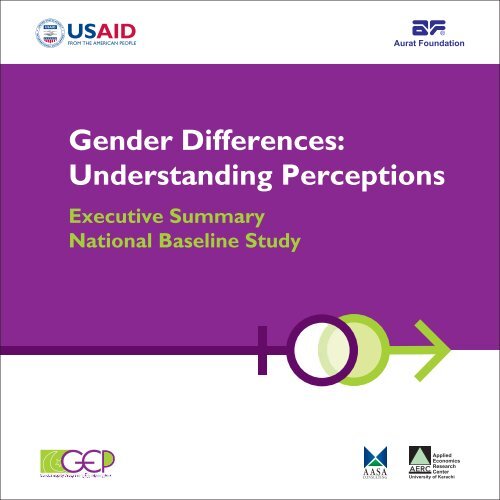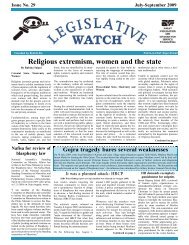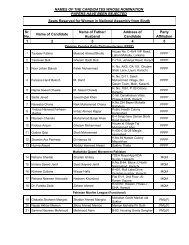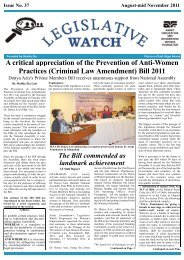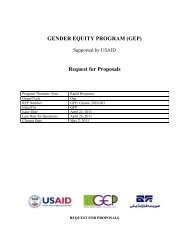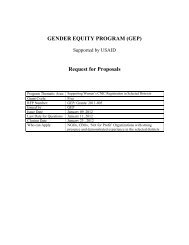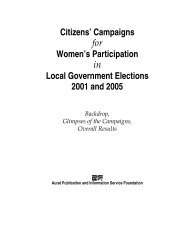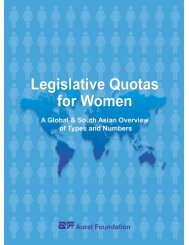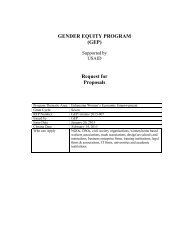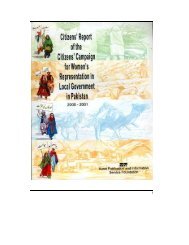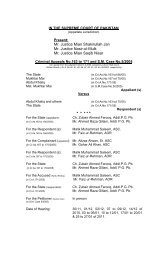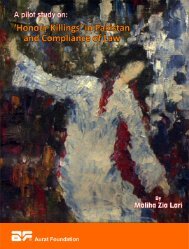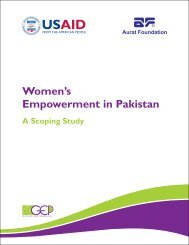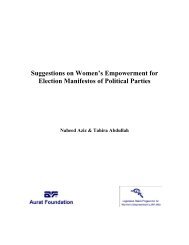Details - Aurat Foundation
Details - Aurat Foundation
Details - Aurat Foundation
Create successful ePaper yourself
Turn your PDF publications into a flip-book with our unique Google optimized e-Paper software.
This publication is made possible by the generous support of the American people through the United<br />
States Agency for International Development (USAID) under the Gender Equity Program of <strong>Aurat</strong><br />
<strong>Foundation</strong>. The contents are the responsibility of the author and do not necessarily reflect the views<br />
of <strong>Aurat</strong> <strong>Foundation</strong>/USAID or the United States Government.
Remembrance<br />
On Sunday March 25, 2012, we lost a valuable member of our team Mansab<br />
Ali, Staff Economist at AERC, due to kidney failure. In his late forties, Mansab<br />
was a key member of this study who always worked tirelessly and diligently.<br />
His life was a continuous struggle, both at personal and professional level and<br />
he overcame challenges against all odds. He was recently admitted to a Ph.D.<br />
program at University of Portsmouth in England but fate could not let him<br />
complete his cherished dream. Our condolences go out to his family and<br />
friends and this report is dedicated to him. He shall be sorely missed by all.
National Baseline Study for Gender Equity Program<br />
i
ii<br />
National Baseline Study for Gender Equity Program
1. Scope of Study 1<br />
2.<br />
2.1<br />
2.2<br />
2.3<br />
Major Findings of the Study<br />
Objective 1: Human Right and Justice<br />
Objective 2: Women's Empowerment<br />
Objective 3: Gender Based Violence<br />
2<br />
2<br />
4<br />
8<br />
3.<br />
3.1<br />
3.2<br />
3.3<br />
Conclusions<br />
Objective 1: Human Right and Justice<br />
Objective 2: Women's Empowerment<br />
Objective 3: Gender Based Violence<br />
13<br />
13<br />
14<br />
14<br />
National Baseline Study for Gender Equity Program<br />
iii
Prof. Dr. Nuzhat Ahmad Team Leader AERC<br />
Mr. Riaz Hussain Co Team Leader AERC<br />
Mr. Haroon Jamal Quantitative Research Specialist AERC<br />
Mr. Zohair Ashir Project Advisor AASA Consulting<br />
Ms. Meher Marker Noshirwani Gender Specialist AASA Consulting<br />
Mr. Danish Rashdi Qualitative Research Specialist AASA Consulting<br />
Ms. Birjis Jaleel Study Coordinator AASA Consulting<br />
Mr. Minhajuddin Siddiqui Study Coordinator AERC<br />
Mr. Amjad Ali Project Coordinator AERC<br />
Syed Roshan Ali Shah Project Coordinator AERC<br />
Mr. Mansab Ali Project Coordinator AERC<br />
Mr. Asghar Ali Project Coordinator AERC<br />
Ms. Mahpara Sadaqat Project Coordinator AERC<br />
Ms. Shehnaz Rashid Project Coordinator AERC<br />
Mr. Noman Saeed Project Coordinator AERC<br />
Mr. Humera Sultana Project Coordinator AERC<br />
Mr. Pervez Kifayat Project Secretary AERC<br />
iv<br />
National Baseline Study for Gender Equity Program
AERC Applied Economics Research Centre<br />
CEDAW Convention for the Elimination of All Forms of Discrimination Against Women<br />
CNIC Computerized National Identity Card<br />
CSO’s Civil Society Organization’s<br />
FBS Federal Bureau of Statistics<br />
FIR First Information Report<br />
GBV Gender Based Violence<br />
GDI Gender-related development index<br />
GEP Gender Equity Program<br />
GRAP Gender Reform Action Plan<br />
KAP Knowledge, Attitude and Practices<br />
KPK Khyber Pakhtunkhaw<br />
MDG’s Millennium Development Goals<br />
MoWD Ministry of Women’s Development<br />
NADRA National Database and Registration Authority<br />
NCSW National Commission on the Status of Women<br />
NGO’s Non Government Organization’s<br />
NPA National Plan of Action<br />
PSUs Primary Sampling Units<br />
TORs Terms of Reference<br />
UN United Nations<br />
UNDP United Nations Development Programme<br />
VAW Violence Against Women<br />
KAP Knowledge, Attitude, and Practice,<br />
WDDs Women Development Departments,<br />
PTCL Pakistan Telecommunication Limited<br />
PIA Pakistan International Airlines<br />
National Baseline Study for Gender Equity Program<br />
v
Study Framework<br />
The Constitution of Pakistan says all citizens are<br />
equal and there should be no discrimination on<br />
the basis of sex. Hence women are guaranteed<br />
fundamental rights, and considered equal citizens<br />
in all respects. Yet, in 2010, more than 8000 cases<br />
of violence against women were recorded,<br />
according to an <strong>Aurat</strong> <strong>Foundation</strong> report on<br />
Violence against Women in Pakistan. Among these<br />
486 cases of domestic violence, 557 cases of<br />
honor killings, 928 cases of rape and gang rape,<br />
and 74 of sexual violence were reported.<br />
Despite all, the gap between theory and practice<br />
continues to widen – between legislation and<br />
implementation, urban and rural disparity, and the<br />
reality of the average woman is in stark contrast<br />
to the progress being made in the political<br />
process, in laws passed, and at policy level. The<br />
reasons underlying the gap are a lack of awareness<br />
of fundamental rights, limited access to justice,<br />
illiteracy, poverty, prevailing patriarchal attitudes,<br />
archaic traditions and customs, and little<br />
knowledge of women's rights among the general<br />
population. It is in this context that the Gender<br />
Equity Program (GEP) is being implemented.<br />
One of GEP's initiatives is this national baseline<br />
study, conducted for two major reasons: first, to<br />
provide a basis for program impact evaluation in<br />
the future; and second, to identify existing on-<br />
ground realities with respect to GEP objectives.<br />
Between 2010 and 2012, six progressive legislation<br />
supporting women's empowerment were made.<br />
These included the Anti Sexual Harassment Act,<br />
National Commission on Status of Women Act,<br />
and the Domestic Violence Bill. And during the<br />
same time, the law on Protection against<br />
Harassment of Women at the Workplace was<br />
implemented which brought around 2000<br />
Government and private organizations to comply<br />
with the law, according to a National Commission<br />
The National Baseline Study on Knowledge,<br />
Attitudes and Practices<br />
The objectives of the national baseline study are:<br />
on the Status of Women Report (2010 –2012). a) to benchmark existing knowledge, attitudes<br />
National Baseline Study for Gender Equity Program<br />
1
and practices (KAP) with respect to women's<br />
rights, women's access to justice and<br />
institutions;<br />
The findings of the study are based on the<br />
b) women's empowerment; quantitative survey and qualitative discussions. The<br />
c) all forms of gender based violence. findings are conveniently divided into the main<br />
objectives of the GEP.<br />
Each of the above objectives consists of a set of<br />
Objective 1: Human Rights and Justice<br />
indicators which have been measured and analyzed<br />
in the study.<br />
Scope of the Study<br />
The study adopted a holistic research methodology<br />
incorporating quantitative and qualitative research<br />
tools, and using scientific random sampling. The<br />
study was conducted nationwide, covering 11200<br />
adult males and females in the quantitative survey;<br />
and 43 Focus Group Discussions (FGDs), 53 Key<br />
Opinion Makers (KOM) Interviews and 15 Case<br />
Studies, in the qualitative survey in Punjab,<br />
Balochistan, Khyber Pakhtunkhwa, Sindh and Gilgit-<br />
Baltistan.<br />
Major Findings of the Study<br />
Various aspects of human rights and justice are<br />
explored in the study including equal rights for men<br />
and women, rights relating to marriage and<br />
divorce, inheritance, political participation, and<br />
access to institutions of justice. Results in the<br />
report are presented with three different angles,<br />
namely knowledge, perceptions and actual<br />
practices prevalent in the household. The results<br />
indicate that majority respondents believe that<br />
women should have equal rights as men. Most men<br />
and women are found to be knowledgeable about<br />
these rights.<br />
2 National Baseline Study for Gender Equity Program
Respondents say that women should have the right<br />
to marry of their own choice, right to demand<br />
divorce, right to decide Haq-e-Meher and Khula and<br />
the right to inheritance based on Shariah. However<br />
comparatively fewer respondents were of the<br />
opinion that women should have the right to<br />
demand divorce and Haq-e-Meher. They also seem<br />
to be less supportive for women's participation in<br />
sporting events. Participation in political activities<br />
has a lot of support especially to exercise the right<br />
to vote but in actual practice few women cast their<br />
votes according to their own choice and the<br />
decisions are often influenced by their husbands and<br />
other members of the family.<br />
One major conclusion regarding human rights is that<br />
in almost all cases female respondents are more in<br />
favour of these rights than male respondents. When<br />
perceptions and rights are compared to the actual<br />
practices prevalent in the households regarding<br />
these rights large differences are observed between<br />
female and male respondents. For instance more<br />
men than women say that women have a share in<br />
inheritance in their household, the right to divorce,<br />
marriages of their choice and right to Khula etc.<br />
National Baseline Study for Gender Equity Program<br />
3
Similarly, most of the women feel that if they want<br />
justice, it is necessary to even go out of the home<br />
for seeking it. Seeking justice outside of home<br />
mostly comprises of going to the police station or<br />
to the court. Yet, women also feel that such step is<br />
necessary when disputes and issues are not settled<br />
within the family or if the situation becomes such<br />
that going outside the home becomes necessary.<br />
4 National Baseline Study for Gender Equity Program
It can be concluded that women lack knowledge<br />
and awareness of the social justice system.<br />
Women perceive the legal system as negative and<br />
find their access to it restrictive, due to the<br />
behavior and attitude of the police and the<br />
complicated and often unending process involved<br />
in settling issues in courts. The feudal system<br />
continues to control the political process in most<br />
parts of the country. In most cases, women vote<br />
under the male influence.<br />
Objective 2: Women's Empowerment<br />
However, the measurement and quantification of<br />
empowerment is quite difficult. It can be only<br />
approximated by using proxies and indicators as it<br />
is a dynamic process that cannot be observed<br />
directly. The results of the study show that most<br />
women (80 percent) believe they should work to<br />
earn a living, most men felt that it was not their<br />
role to do so. What is encouraging is that at least<br />
93 percent of working women say that they can<br />
spend their income as and how they want. And<br />
around half of the total women interviewed enjoy<br />
permission to work.<br />
Women's empowerment is a key factor in the<br />
well-being of women and their households.<br />
National Baseline Study for Gender Equity Program<br />
5
It is also observed through qualitative findings, that<br />
for women who prefer to and could work, there<br />
are not equal opportunities especially in areas<br />
which traditionally are dominated by men; and<br />
therefore the options for women are limited to<br />
the stereotyped gender roles as care-givers,<br />
teachers, nurses, etc. Barriers to women's<br />
participation have been defined as restrictions<br />
from the family, male insecurity in terms of losing<br />
control over women, and gaining economic<br />
independence. The religious sections of the society<br />
view women as having separate roles from men,<br />
which is why they maintain that women cannot be<br />
given all the opportunities and roles that men can<br />
enjoy.<br />
6 National Baseline Study for Gender Equity Program
Most women (70 percent) also feel they should be<br />
part of the financial decisions pertaining to their<br />
households. Men however have a different view<br />
to this. For them, making household financial<br />
decisions is not a woman's forte and that they<br />
don't even have the knowledge to do so, and<br />
women cannot make appropriate decisions.<br />
Women's empowerment has been based on the<br />
number of decisions a woman could take<br />
pertaining to household matters. The decisions<br />
include those on education, health, marriage,<br />
home chores, employment, family planning, and<br />
daily ration. Not many women have bank<br />
accounts, and even fewer haave taken personal<br />
loans. But in most cases, the loans haave been<br />
taken on husband's instructions, and not<br />
necessarily of their own choice.<br />
Women's mobility has also been seen as part of<br />
women's empowerment, and the extent of<br />
women's mobility has been gauged through<br />
answers to the question “For what purpose are<br />
women allowed to leave the house?”. Majority of<br />
women say they can easily step out of the house to<br />
meet neighbors, and many also do so for sale and<br />
purchase of items, visit to the hospital, or to attend<br />
weddings. Mobility of women however is limited in<br />
case of education, job and visits to bank. Mobility is<br />
further restricted by the fact that women need<br />
permission from family members to go out and<br />
usually have to be accompanied by someone.<br />
Interestingly men think women have more freedom<br />
of mobility contrary to what females' responses<br />
indicate.<br />
The concept of empowerment appears to be<br />
narrow; most women define environment in terms<br />
of their basic needs. Women are not able to move<br />
about freely and even those who do must inform<br />
their families first. Implementation of existing laws<br />
National Baseline Study for Gender Equity Program<br />
7
is seen as a main priority in empowering women,<br />
followed by education, family support, freedom to<br />
work, power to make their own decisions,<br />
economic independence and political<br />
empowerment. For women who work, there<br />
appears to be a complete lack of awareness of any<br />
labor laws, or legislation which protects women<br />
against sexual harassment at workplace.<br />
Objective 3: Gender Based Violence<br />
1<br />
A recent study on Gender-Based violence in<br />
Pakistan concluded that “Gender-based violence is<br />
a living reality in present day Pakistan. Though<br />
these crimes are prevalent around the world, in<br />
Pakistan they are uniquely legitimized in the name<br />
of culture, tradition, religion, and morality”. A<br />
module of domestic and gender-based violence<br />
was introduced in the quantitative survey to<br />
obtain perception as well as incidence of domestic<br />
and gender-based violence. The worst gender<br />
based violence takes the form of honor killing, acid<br />
throwing, physically and sexually abusing women<br />
and sexual harassment.<br />
A small percentage of the women feel that men<br />
have the right to hit women, and strangely enough,<br />
at least 9 percent women find honor killing<br />
justified, while an even lesser percentage agrees<br />
with the concept of wanni/swara. These are<br />
women who feel that under certain circumstances<br />
a man had the religious right to hit a woman after<br />
he has failed to verbally settle the dispute; because<br />
8 National Baseline Study for Gender Equity Program
the “honor” of the family rests on her behavior.<br />
What is apparent is that the onus is on the<br />
woman, to be faithful, “proper” and obedient, and<br />
it is her responsibility to avoid domestic violence.<br />
A majority of women however believed that men<br />
do not have a right to hit woman, and even<br />
according to Islam, no such right has been given.<br />
Majority of respondents however strongly oppose<br />
men hitting women. But the study shows that 15<br />
percent of women have been hit by their husbands<br />
in the past and 1.5 percent also disclose that they<br />
have been sexually abused. In the qualitative<br />
research it is highlighted that mental abuse is an<br />
aspect of violence which is not easy to identify,<br />
since it is not physically visible. The women who<br />
identified with it instantly were those in the<br />
shelter homes, who had been through mental<br />
violence.<br />
As mental abuse has no physical manifestation, it<br />
was described as mental stress. However, the<br />
women feel that extreme cases of violence should<br />
be reported to the police, NGOs, or the media.<br />
It is generally admitted that GBV begins at home,<br />
and from the very beginning inequalities start to<br />
become visible between male and female siblings.<br />
GBV has been defined as prostitution, physical<br />
beating of women by men, and women forcibly<br />
confined at home and not allowed to step out of<br />
the house. In Balochistan women are said to be<br />
forced into frequent pregnancies – seen as a form<br />
of sexual violence – due to the husband's wish to<br />
have more male offspring.<br />
The study has identified reasons for mental and<br />
physical violence along with types of mental and<br />
physical violence being committed against women,<br />
which are displayed below:<br />
National Baseline Study for Gender Equity Program<br />
9
10 National Baseline Study for Gender Equity Program
Reporting of gender based crimes is very low<br />
because when a woman complains, she is blamed,<br />
and the judicial system is not such that it becomes<br />
easy for her to seek justice. In the event a case is<br />
reported, the woman's family becomes an outcast,<br />
and society does not support a rape victim, and<br />
she is blamed for the incident. Police are not<br />
trusted; in fact they are feared, and demand<br />
witnesses, so women do not want to pursue the<br />
case.<br />
It is clear that there is awareness of GBV amongst<br />
the masses, and masses do recognize the types of<br />
violence being perpetrated against women. What<br />
is unfortunate is that violence against women<br />
starts at home. Some women think that hitting<br />
another woman is justified. Within the family unit,<br />
women themselves perpetuate gender<br />
discrimination and violence. Harassment against<br />
women has increased across the board as in<br />
markets and bazaars, public transport and public<br />
places. There are perhaps many more instances of<br />
GBV than are being reported – majority of the<br />
cases are simply not reported as the system of<br />
justice and reporting are manipulated in such a way<br />
that it brings only further hardship for women.<br />
National Baseline Study for Gender Equity Program<br />
11
Finally, it is apparent that a huge gap continues to<br />
exist between legislation and implementation and<br />
while the Constitution of Pakistan allows a<br />
number of rights to both men and women, it does<br />
not ensure that the implementation of such rights<br />
is enforced.<br />
Very few women are aware of the recent laws<br />
which have been passed in parliament for violence<br />
against women, but they think that since the legal<br />
system is corrupt, and the men have economic<br />
power, the law would not be enforced.<br />
This study has raised various issues that women<br />
face in the Pakistani society. While there is general<br />
awareness of gender-based issues being faced by<br />
women, no concrete steps are being taken to<br />
ensure that the root causes of such issues are<br />
addressed, and that implementation of penalties<br />
and rights is enforced to ensure protection to<br />
women.<br />
12 National Baseline Study for Gender Equity Program
Based on the findings of the report, the major<br />
conclusions are summarized here and linked to<br />
GEP's three program objectives.<br />
Objective One: Enhancing gender<br />
equity by expanding women's access to<br />
justice and women's human rights.<br />
Generally, women’s knowledge and awareness<br />
of the social justice system is very low.<br />
Very few women visit police stations or<br />
courts to seek justice.<br />
According to women, the image of the legal<br />
system is negative and also access to the legal<br />
system is restrictive because women do not<br />
feel comfortable going to court /police station<br />
where the environment is not conducive.<br />
Women who access the social justice system<br />
are perceived as bringing disrespect to family.<br />
Irrespective of gender, even the educated<br />
urban men and women do not understand the<br />
concept of rights. Even men do not know<br />
their rights.<br />
A high proportion of women vote but in most<br />
cases women vote under male influence.<br />
With a few exceptions the feudal system still<br />
controls the political process in the majority<br />
of the country.<br />
Many women believe that they do not have<br />
equal rights/opportunities to men and they<br />
have to claim their rights, by convincing their<br />
family and society.<br />
Women are denied their inheritance rights<br />
because women are perceived as being<br />
dependent on men.<br />
Only half of the respondents are in favour of<br />
giving women the right to demand divorce.<br />
The right to divorce exists legally, but is rarely<br />
given and exercised by women.<br />
Women should not ask for the right to<br />
determine their Haq-e-Meher as “only family<br />
members make correct decisions for them”.<br />
The justification for the right to Khula is that<br />
women should compromise and reconcile<br />
rather than breakup marital life.<br />
Dowry is given to women to protect and<br />
empower them.<br />
Not many women seek their right to<br />
National Baseline Study for Gender Equity Program<br />
13
inheritance and give it up for men; women<br />
who ask for their inheritance are seen as<br />
“mean and selfish women”.<br />
There is significant disparity between urban<br />
and rural areas in terms of both awareness<br />
about women's rights and access to justice.<br />
There is greater awareness and access in<br />
urban areas than rural.<br />
Media has played a positive role in spreading<br />
awareness of women’s rights by highlighting<br />
key issues affecting women.<br />
Objective 2: Increasing women's<br />
empowerment by expanding knowledge<br />
of their rights and opportunities to<br />
exercise their rights in the workplace,<br />
community, and home.<br />
The vision of empowerment is very narrow,<br />
most women define environment in terms of<br />
their basic needs. For example, even if she is<br />
working she is not automatically empowered.<br />
Women are not able to move about freely<br />
and even those who do must inform their<br />
families first.<br />
A woman's mobility is further restricted by<br />
time, distance and area.<br />
Implementation of existing laws is seen as a<br />
main priority in empowering women, followed<br />
by education, family support, freedom to<br />
work, power to make their own decisions,<br />
economic independence and political<br />
empowerment.<br />
While there is a general support for women<br />
participation in the political process leading to<br />
greater empowerment, however, there is<br />
strong resistance from the religious and tribal<br />
groups, who thought that Islam does not<br />
allow women to participate in the political<br />
process.<br />
Right to inheritance for women is provided<br />
under the law but due to unawareness, social,<br />
and cultural norms, women do not get their<br />
fair share of inheritance, they hesitate to claim<br />
their right, the male members of the family<br />
have control over women's inheritance.<br />
Police is viewed as corrupt and organized<br />
persecutors of innocent people who approach<br />
them for help. Police appears to be a tool in<br />
the hands of the powerful and the influential<br />
who command it to their whims and<br />
requirements.<br />
There is a complete lack of awareness and no<br />
knowledge of any labor laws, or legislation<br />
which protect women against sexual<br />
harassment at workplace.<br />
Objective 3: Combating gender-based<br />
violence.<br />
There is awareness of gender based violence<br />
(GBV) amongst the masses. The most<br />
common form of violence is in prostitution,<br />
physical beatings, mental trauma, physical<br />
confinement at home and domestic violence.<br />
A large number of women think that a man<br />
has the right to hit a woman and that it is<br />
justified.<br />
The family unit is the seed and source of<br />
domestic violence and gender discrimination.<br />
Within the family unit, women themselves<br />
perpetuate gender discrimination and<br />
violence.<br />
In a large number of cases of gender based<br />
14 National Baseline Study for Gender Equity Program
violence the offenders are husband or other<br />
male members of the family, very few cases of<br />
any form of violence are reported.<br />
Women generally do not seek justice for<br />
violence and crimes committed against them.<br />
Harassment against women has increased<br />
across the board from markets and bazaars,<br />
to public transport and public places.<br />
There are perhaps more instances of GBV as<br />
most cases are not generally reported.<br />
A woman is considered inferior and weak<br />
while promoting gender based violence.<br />
A huge gap exists between legislation and<br />
implementation and while the Constitution of<br />
Pakistan allows a number of rights to both<br />
men and women, it does not ensure that the<br />
implementation of such rights is enforced.<br />
Very few women are aware of the recent laws<br />
which have been passed by the parliament for<br />
violence against women, but they thought that<br />
since the legal system is corrupt, and the men<br />
enjoy economic power, the law will not be<br />
enforced.<br />
National Baseline Study for Gender Equity Program<br />
15


